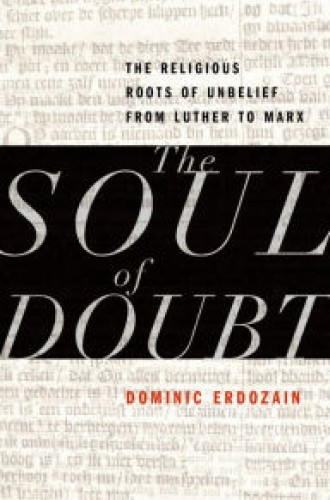Faith’s ghastly legacy
Church history is theology learned from examples. At least that’s the way Dominic Erdozain sees it; and it makes for compelling and absorbing reading. Judiciously researched and lucidly, often deliciously, argued, The Soul of Doubt is a 500-year sweep of elegant simplicity. Erdozain has two targets: the pervasive secular compulsion “to build a narrative of objective, scientific reason triumphing over ignorance and superstition,” and the complacency of Christians, both lay and scholarly, in failing to realize that the responsibility for rebellion against the faith lies invariably at their own door.
The latter is a criticism leveled with love, but nonetheless an excoriation that makes the book resemble a sober Lenten scourging. Any pastor who has been dismayed by a congregation’s superiority complex in relation to its neighborhood will be struck by these words of Ludwig Feuerbach: “Faith gives a man a peculiar sense of his own dignity and importance. The believer finds himself distinguished above other men, exalted above the natural man; he knows himself to be a person of distinction, in the possession of peculiar privileges; believers are aristocrats, unbelievers plebeians. God is this distinction between and pre-eminence of believers above unbelievers, personified.” In other words, Christianity has frequently become a pretext for arrogance, a cover for complacency, such that a critic like Feuerbach can see faith and love at war, and thus perceive the need to assert a pure, atheist virtue of love in the face of faith’s ghastly legacy.
Feuerbach is among numerous examples of the phenomenon at the heart of Erdozain’s argument: earnest and upright citizens who are drawn to the God of Jesus Christ but come to see Christianity as overly precise and hasty to judge. The church has repeatedly become a factory of fear, offering little besides “doom, destruction, and selective redemption.” The culprit above all is Augustine, held to have burdened the race with his own perversities. As Erdozain wryly notes, “The Augustinian psychology of terror that provoked the Reformation arguably destroyed it.” Unbelief came to be fueled, in the words of George Eliot, by fear of “a God who instead of sharing and aiding our human sympathies, is directly in collision with them.” Erdozain exquisitely observes that Eliot’s unbelief, like that of many of the figures in this survey, “knew what a religion ought to look like. It retained the title of ownership after it had left the building.”





